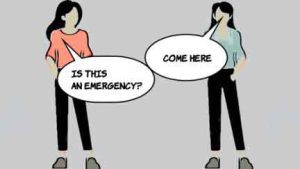When someone says ‘come here’, it can be difficult to know how to respond. Depending on the context, the right response can be friendly and accommodating, or it could be stern and authoritative.
No matter the situation, having a few go-to responses can help you navigate these tricky conversations.
Here, I’ll show you 20 of the best responses to the phrase ‘come here’, from the polite and helpful to the more assertive and authoritative options.
Whether you need to get out of a tough situation or simply want to respond with some wit and charm, this list has something for everyone.
So, if you’re looking for the best responses to ‘come here’, you’ve come to the right place!
20 Best Replies to ‘Come Here’
When someone tells you to ‘come here’, you may be unsure of how to respond. Do you go? Do you stay? Do you ask why?
While it may be difficult to know what the best response is in any given situation, I have compiled a list of the twenty best responses to ‘come here’ that you can use in any situation.
From clever comebacks to clever diversions, these 20 responses will help you handle the situation with confidence and grace.
Whether it’s a friend, family member, or a stranger, you’ll be prepared and equipped with the right words.
- Can you tell me why?
- Can I have a minute?
- I’ll be there shortly.
- Can you come to me?
- What do you need?
- Can you tell me more?
- Can it wait?
- Is this an emergency?
- What’s going on?
- I’m on my way.
- I’ll be there in a few.
- I need a few minutes.
- What do you need me for?
- Do you need me right now?
- I can’t come now, but I can come later.
- I’d like to know why before I come
- I’ll come if you come too
- I’m coming…eventually
- Yes, what do you need?
- What can I do for you?
Can you tell me why?

When someone tells you to ‘come here’, it’s possible that they are requesting something from you. Asking why can help you understand the purpose of the request.
Can I have a minute?
If you’re busy with something, you may need to take a few minutes to finish it up before you go to them.
I’ll be there shortly.
This is a polite way to indicate that you will be there soon, but you may need a few moments to wrap up what you’re doing.
Can you come to me?

If you’re not able to go to the person right away, you can suggest that they come to you instead.
What do you need?
Asking what the other person needs from you can help you understand why they are requesting you to come.
Can you tell me more?
This can help you understand the context of the request and decide if you should go.
Can it wait?
This allows the speaker to take a moment and consider the urgency of the request; if the matter can be dealt with at a later time, that allows the person being asked to come to prioritize their tasks and manage their time more efficiently.
Additionally, it allows the person making the request to give more information about the matter and its urgency so that the person being asked can make an informed decision about whether or not it is something that needs to be attended to immediately or if it can wait.
In particular, if the matter is not of an urgent nature, using this phrase in response can help to prevent unnecessary interruptions and help the person being asked to come to maintain their focus on their current task.
Is this an emergency?

This is a suitable response that can provide more context for the situation. It is important to be aware of the urgency of the situation and to know if it is something that needs to be addressed immediately or not.
By asking if Ii is an emergency, it can help to determine if the urgency of the request is such that it requires immediate action or if it is something that can wait until a later time.
Asking this question can also help to provide clarification if the request was made in a less than clear manner. It can be a useful tool in helping to provide a better understanding of the request.
What’s going on?
This is a suitable response when someone tells you ‘come here’ because it’s a polite way to ask why you should come.
It also shows that you’re interested in what’s happening and that you’re willing to take the initiative and find out. It’s a way to show that you care and that you’re not just blindly following orders.
Additionally, it gives the person the opportunity to explain why it’s important for you to come over and what they need you to do.
It’s a way to show that you’re willing to listen and understand the situation and that you’re taking it seriously.
I’m on my way
This is a polite way to indicate that you understand the request and are on your way to meet them.
It conveys a sense of urgency and immediacy, indicating that you are taking the request seriously and making the effort to go to the person as soon as you possibly can.
It also shows that you are committed to following through on the request and that you take it seriously.
I’ll be there in a few
This lets the person know that you will be there soon, but need a few moments to wrap up what you’re doing first.
It shows respect for the other person’s time, as it implies that you are coming as soon as you can, but not necessarily right away.
It also allows for a bit of flexibility in terms of when you can actually arrive, depending on the situation.
Furthermore, it allows both parties to be on the same page in terms of expectations, so each can plan accordingly.
I need a few minutes
This is a polite way to let the person know that you need a few moments to finish what you’re doing before you go to them.
This allows you to acknowledge the request without immediately committing to the action.
It gives you the opportunity to think about the request, decide if it is something you want to do, and work out a timeline for when it might be possible for you to come.
It also shows respect for the person making the request, as it implies that you are taking the request seriously and considering it, rather than simply ignoring it.
In addition, it can be a way to start a dialogue if there are factors that make it difficult or impossible to come right away.
Ultimately, it is a way to show that you are listening to the request and taking it seriously without having to commit right away.
What do you need me for?
Asking what the person needs you for can help you understand the purpose of the request and decide if you should go.
Do you need me right now?
If the request is urgent, you can ask if they need you right away.
This phrase shows a level of respect and consideration for the other person’s needs.
It is a polite way to respond to the request and allows the person making the request to take the time to consider if they truly need assistance at that present moment.
It also allows the person making the request to explain why they need assistance and what they need help with.
This phrase also shows that the person asking is willing to be flexible and accommodating to the other person’s needs and is willing to come help in whatever way is necessary.
15. I can’t come now, but I can come later
If you’re not able to go right away, you can let the person know that you can come later
This response offers both flexibility and politeness, allowing the other person to know that you are not completely disregarding their request, but that due to a conflicting schedule or obligation, you will be able to come when a more suitable time arises.
Not only is this response respectful, but it also allows you to maintain control of your schedule and not be swayed by the demands of someone else.
Additionally, by providing an alternative time to come, it is likely that the other person will appreciate that you are still willing to come and provide some degree of resolution for the request.
I’d like to know why before I come
If you need more information before you go to the person, you can let them know that you’d like to know why they are requesting you to come.
This response shows respect and responsibility, as it demonstrates that the person is willing to make sure they understand the situation before taking any action.
It also shows that the person is conscious of their own boundaries and is comfortable with asserting them.
This type of response shows that the person is confident in their decision-making abilities and is aware of the implications of their actions.
It is a sign of maturity and respect for the other person, and it sets the tone for an open and honest conversation.
I’ll come if you come too
When someone tells you to come here, responding with I’ll come if you come too is a great way to show that you are a supportive friend who wants to be there for them.
It conveys a sense of care and mutual understanding that you are both in it together. It also shows that you are unafraid to take a risk and that you are willing to go out of your comfort zone to be there for someone.
This response can create a sense of trust and loyalty between two people and can foster a strong bond as you both take on the challenge together.
It is a great way to show that you are a considerate and dependable friend and someone who will always be there for them.
I’m coming…eventually
I’m coming…eventually is a great response when someone tells you to ‘come here’. This response acknowledges that you understand and respect the request, but you have other things to take care of first.
It is a way of letting the other person know that you will be there but on your own schedule and timeline. It speaks to your need for autonomy and independence, while still respecting the other person’s wishes.
This response also allows you to maintain control over your own life and decisions while opening up the possibility of negotiation or compromise.
It is a polite, yet assertive way of expressing your own needs without disregarding the needs of others.
Yes, what do you need?
Yes, what do you need? is an excellent response to when someone tells you ‘come here’.
This is a polite and personal way to respond, letting the speaker know that you are willing to help them.
It also shows that you are attentive and have a genuine curiosity to understand their needs.
This response also demonstrates that you are not simply coming over out of obligation; instead, you are genuinely interested in helping the speaker.
It also shows that you understand the importance of having a positive and supportive attitude, even when the speaker’s request is unclear or vague.
By responding this way, you are setting a tone of respect and understanding
What can I do for you?
When someone tells you ‘come here’, a great response is What can I do for you? This response shows that you are attentive and willing to help in whatever capacity is needed.
It also implies a willingness to listen and understand what the other person needs from you. It is an excellent way to show that you are open, understanding, and ready to give whatever assistance may be required.
By expressing your willingness to help, you let the other person know that you care and will do whatever you can to make the situation better.
It is a great response that can help create an atmosphere of trust and understanding between you and the other person.
Conclusion
It’s clear that everyone has their own style and preference when it comes to responding to someone telling them to ‘come here’.
Whether you want to be direct, humorous, silly, or thoughtful in your response, there are plenty of great options to choose from.
From creative comebacks, like I’ll come if you come too and I’m coming…eventually to more serious answers like Yes, what do you need? and What can I do for you? there’s a response that’s perfect for any situation.
Depending on the situation, and your mood, you can choose to be direct, subtle, humorous, or even a combination of all three.
No matter how you choose to respond, it’s important to stay mindful of the other person’s feelings and the context of the conversation.
Ultimately, the best response is the one that makes you feel comfortable and allows you to express yourself in a way that is both meaningful and appropriate.
No matter what you choose, these 20 best responses to ‘come here’ are sure to make a lasting impression and help you stand out from the crowd.